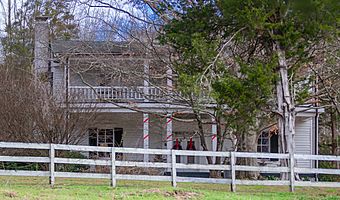Beech Grove (Nashville, Tennessee) facts for kids
Quick facts for kids |
|
|
Beech Grove
|
|

Beech Grove
|
|
| Location | 8423 Old Harding Pike, Nashville, Tennessee, U.S. |
|---|---|
| Area | 12 acres (4.9 ha) |
| Built | c. 1850 |
| Built by | Thomas Jones and Caleb Lucas |
| Architectural style | Colonial Revival |
| MPS | Historic Family Farms in Middle Tennessee MPS |
| NRHP reference No. | 07001163 |
| Added to NRHP | November 8, 2007 |
Beech Grove is a beautiful historic house in Nashville, Tennessee, USA. It started as a log house around 1850. This property was once a large farm, known as a plantation, where people were forced to work without pay. Later, in the 1910s, it became a farm for raising animals.
Contents
Where is Beech Grove Located?
This historic property can be found at 8423 Old Harding Pike in Nashville. Nashville is the main city in Davidson County, Tennessee.
The Story of Beech Grove
Early Owners and the Farm's Growth
The land where Beech Grove stands first belonged to Elisha Sherrill. In 1801, Hugh Allison bought 200 acres of this land. Mr. Allison was part of the Davidson County Court. He lived on the farm with his wife, Lydia, and their five children. Sadly, ten people were forced to work for him.
When Hugh Allison passed away in 1835, his son, Thomas Jefferson Allison, inherited the farm. Thomas Allison bought even more land, making the farm much bigger, about 1,150 acres. By 1840, 22 people were forced to work on his farm. By 1860, this number grew to 53 people. This large farm became known as a Southern plantation. Thomas Allison lived there with his wife, Tabitha, and their six children.
Building the Main House
Around 1850, the two-story log house was built for the Allison family. Two skilled carpenters, Thomas Jones and Caleb Lucas, built it. The house was designed in the Greek Revival architecture style. This style was popular at the time.
Changes During and After the Civil War
During the American Civil War, many people who were enslaved on the farm found ways to escape. They used the railroad to reach freedom. After the war ended, the remaining 20 people who had been enslaved were now free. They continued to work on the property as tenant farmers. This meant they rented land to farm.
Thomas Allison and his wife, Tabitha, continued to live in the house. Thomas passed away in 1897, and Tabitha in 1910.
New Owners and Modern Changes
After Tabitha's death, the property was inherited by her granddaughter, Allie Morton, and her husband, Sam. They decided to change the farm. They turned it into a livestock farm, focusing on raising animals.
In the 1920s, the Mortons updated the house's look. They redesigned it in the Colonial Revival architecture style. This style gave the house a classic, traditional appearance. The Mortons sold the house in 1975. Later, the Kacki family bought it in 1993.
Why Beech Grove is Important
Beech Grove is considered a historically important place. It has been listed on the National Register of Historic Places since November 8, 2007. This listing means the house is recognized for its special history and architecture.



